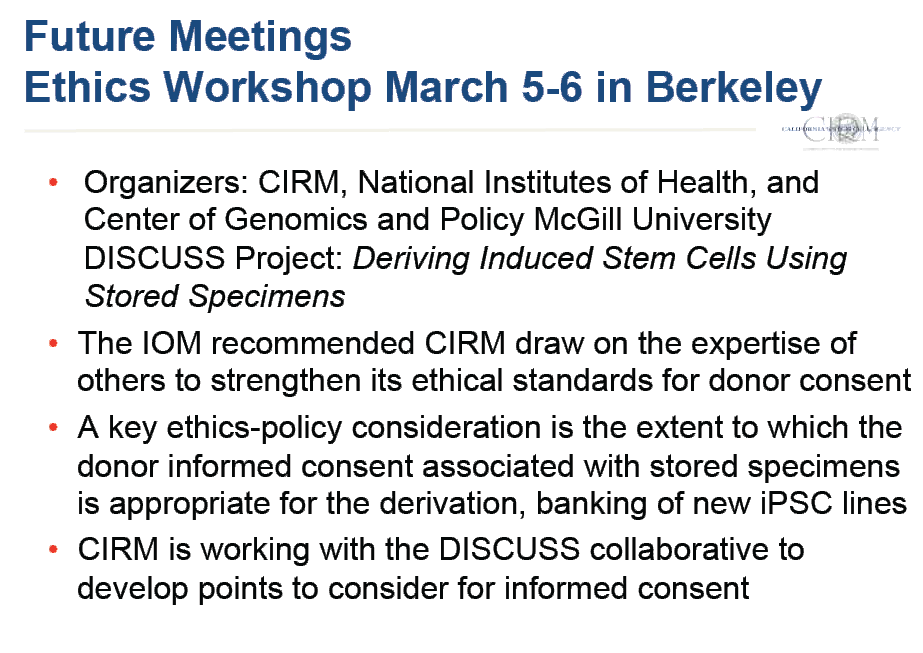The California stem cell agency's $40
million stem cell genomics effort is receiving a moderate amount of attention in California media outlets and on some national online sites.
Some in the world of academic science
might say, “So what.” The simple answer is that if the agency's
work is unnoticed or unappreciated by the public, raising the cash to
continue its awards beyond 2017 is unlikely. Funds will run out then
for new grants, and the agency is looking for ways to stave off its
demise. Its needs public recognition – particularly among
well-endowed circles, be they private, industry or governmental.
The agency could be reasonably satisfied with its media play. This week's coverage represents an increase in media attention compared to the usual meager stories about the agency's board meetings.
(After this item was posted, we caught up with an item by Kevin McCormack on the agency's blog. McCormack, the top communications person at CIRM, said,
In California, stories appeared in the San Francisco Chronicle (Erin Allday writing), the San Diego U-T(Bradley Fikes), the San Francisco Business Times (Ron Leuty), the Sacramento Bee (David Jensen), Palo Alto Online and San Diego Metro. Nationally,
Xconomy (Bruce Bigelow)and Genetic Engineering News carried pieces.
(After this item was posted, we caught up with an item by Kevin McCormack on the agency's blog. McCormack, the top communications person at CIRM, said,
("Reporters from newspapers, radio, TV and online news outlets around the state seemed to...appreciate the significance of the award.
("The story was carried in outlets from the Sacramento Bee and San Francisco Chronicle to the San Diego Union Tribune. ABC7 TV in San Francisco covered the meeting and NPR stations around the state also aired pieces about it. It even caught the interest of the sometimes-jaded scientific business press.
("The money we use to fund this research comes from the people of California, thanks to Proposition 71, so it’s important that they know how we are spending their money. This round of stories showed them it’s being used in ways that could one day help change the face of medicine.")
The Associated Press did not carry a
story, although the news service had one last Sunday, which was a
rewrite of The Bee story that day. Duplicates of today's Bee story
are likely to appear in California via the McClatchy-Tribune News
Service, which distributes Bee articles to other outlets.
Most of the stories yesterday and today
made little or no mention of the controversial aspects of the award
process.
(Shortly after this item was posted,
Nick Paul Taylor of FierceBiotech posted a piece that began,
“Illumina ($ILMN) is a company that has become used to success. Over the past year its share price has soared 180% as it has established a dominant position in what is potentially a $20 billion market. Yet this week it tasted defeat when Stanford University beat it to a $40 million grant to set up a stem cell genomics center in California.”
(GenomeWeb also filed a late story.)
The Chronicle story by Allday
noted that the award was the board's “first formal foray” into
genomics. Fikes' story in the San Diego U-T carried brief remarks
from Jeanne Loring of Scripps, whose genomics proposal was rejected
by CIRM, and Joe Panetta, president of the San Diego life sciences
industry group, Biocom.
Panetta was attending his first meeting
as a member of the agency's governing board. At the session, Panetta
pressed for broader geographic representation, which would have
favored Scripps' proposal. He told Fikes that he intends to become “a
lot more engaged” in the grant review process.
Loring said the value of Illumina,
Inc., as her partner was undervalued in the CIRM grant review
process.
Here is Stanford's press release by Krista Conger, which
carries the names of other researchers involved in addition to ones
previously identified.



